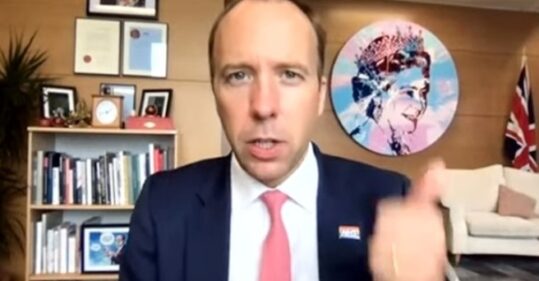Hancock commits to allocating funds to clear care backlog

Matt Hancock has said the care backlog from the Covid crisis could represent ‘the biggest pressure on the NHS in its history’ but ‘absolutely commits’ to giving the NHS the funding to tackle it.
Although, the health and social care secretary warned the scale of the problem was still unknown because of the number of patients who had not yet come forward for care, speaking at the NHS Confederation conference today.
Mr Hancock, pictured speaking about the backlog at the conference above, told delegates the Government has not yet concluded negotiations ‘about what extra funding will be needed to do the job’, although ‘there’s a reasonably clear picture’ on what is required.
Related Article: New preceptorship package for social care nurses
There were 5.9m fewer referrals to elective care made in 2020 compared to 2019, because of the disruption of the pandemic and the public not coming forward for treatment, according to the Nuffield Trust. This is on top of the record-breaking 5.1m people already waiting for hospital treatment in England.
Mr Hancock told the conference: ‘We must be prepared – even with the system running at 100%, even with everyone working incredibly hard – that if all that demand comes back, we would have the biggest pressure on the NHS in its history.’
People were now regaining confidence to approach health services, he said. ‘And we know that as people re-present with problems, problems they might not have wanted to bother the NHS with over the last 18 months, we will see the waiting list go up.’
Jude Diggins, RCN interim director of nursing, policy and public affairs, said: ‘We look forward to seeing just how much funding the health secretary will allocate to deal with the backlog of care and treatment once the pandemic has abated.’
She pointed out there was a backlog before the pandemic and ‘tens of thousands of nursing vacancies’ and that ‘nursing staff urgently need a fully funded comprehensive workforce plan’.
Related Article: Applications to study nursing in England at ‘new low’
Also speaking at the conference today, chief medical officer Professor Chris Whitty agreed ‘the coming winter will probably be quite a difficult one’.
Professor Whitty said he expects an autumn and winter surge of Covid-19, although the scale is ‘uncertain’. Flu cases are also likely to rise this winter, because there was ‘minimal flu last winter’, unless there a ‘very significant Covid surge’ sees people reducing social contact once again, he added.
He explained: ‘So either we will have a very significant Covid surge, people will minimise their contacts and we will have less respiratory viruses or people will get back to a more normal life, there will be some Covid but on top of that we will go back to having a flu surge.’
Related Article: Paul Rees appointed as permanent NMC chief executive and registrar
Mr Whitty concluded: ‘We have to be aware that Covid has not thrown its last surprise at us – and there will be several more over the next period.’

See how our symptom tool can help you make better sense of patient presentations
Click here to search a symptom




